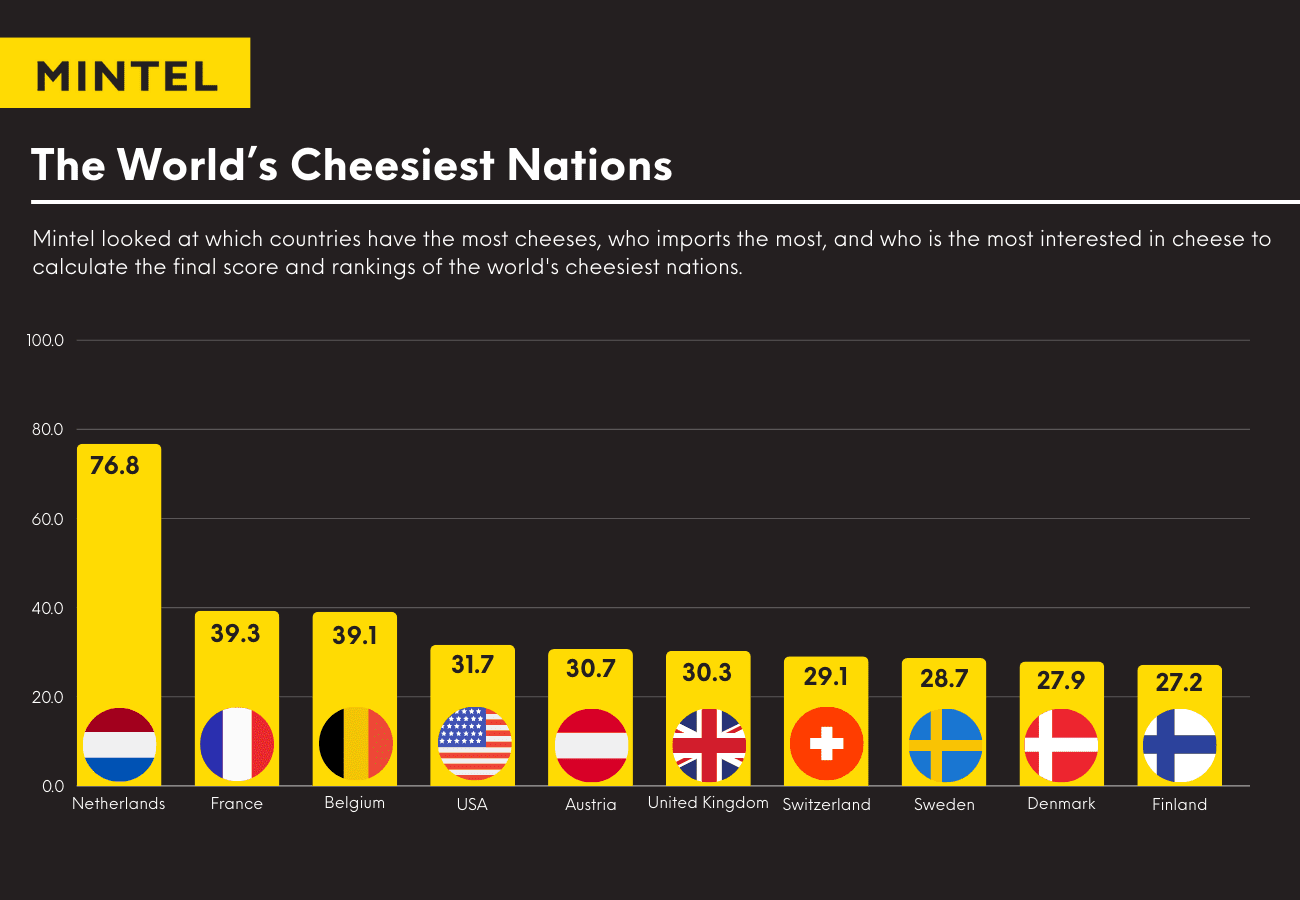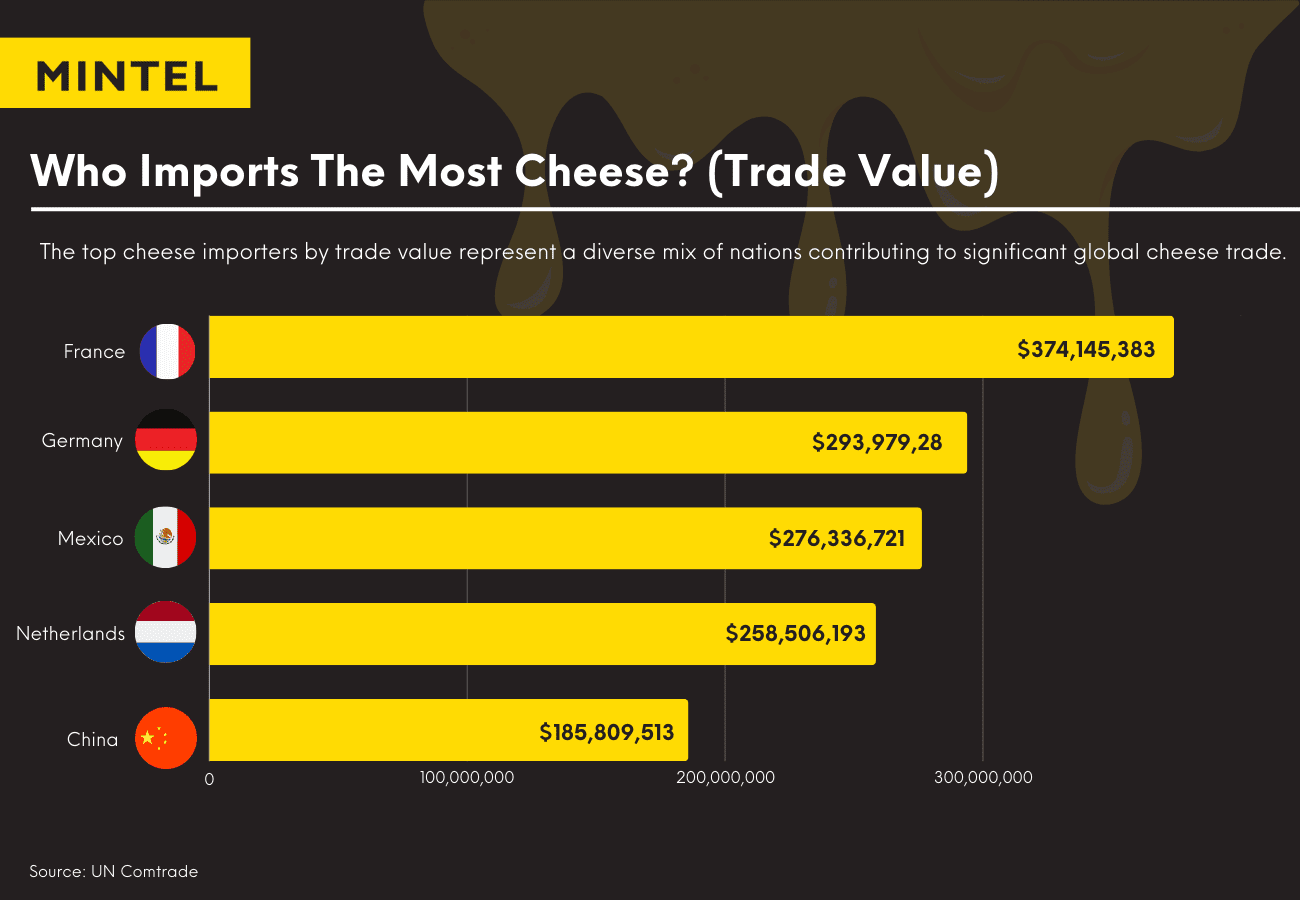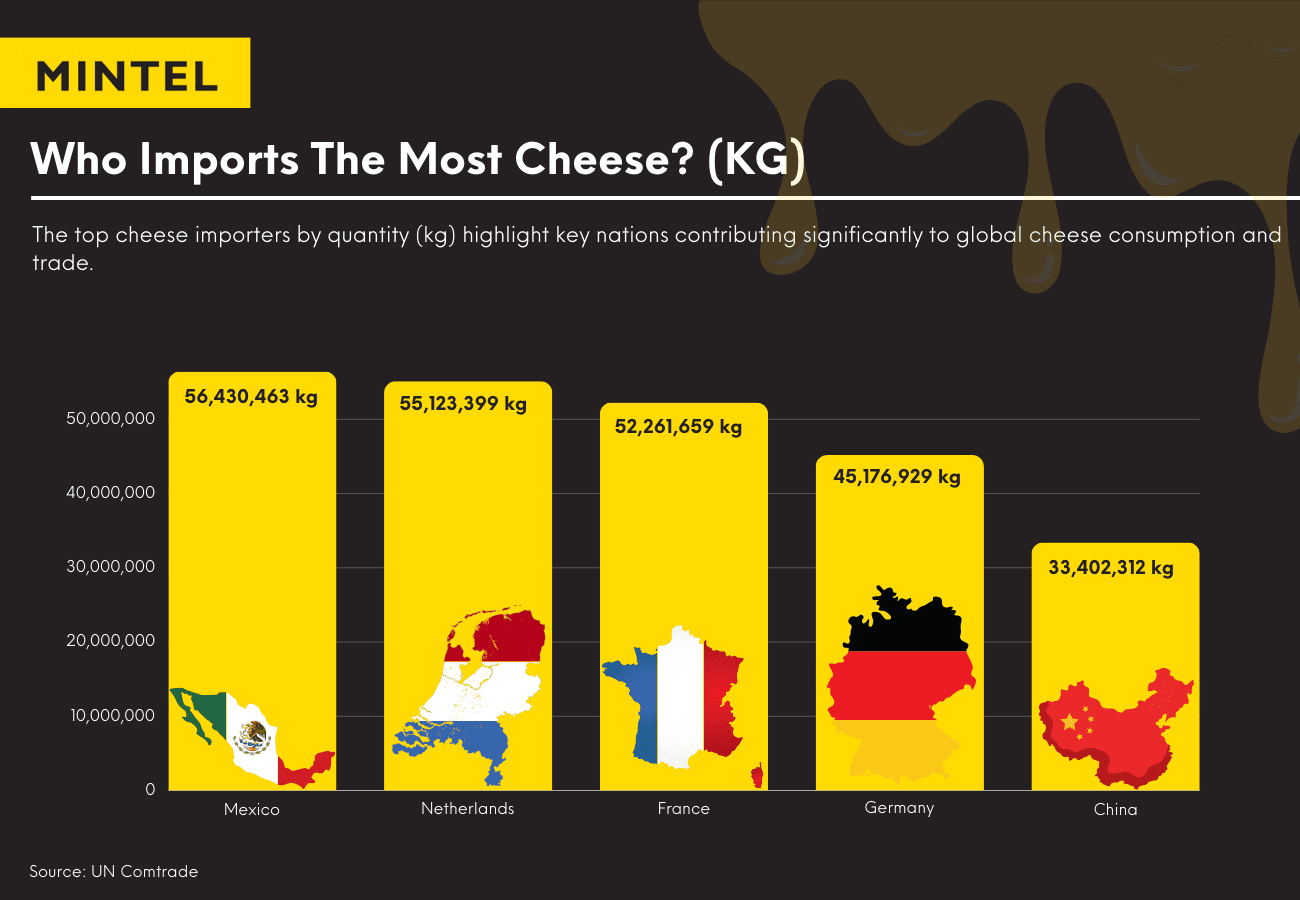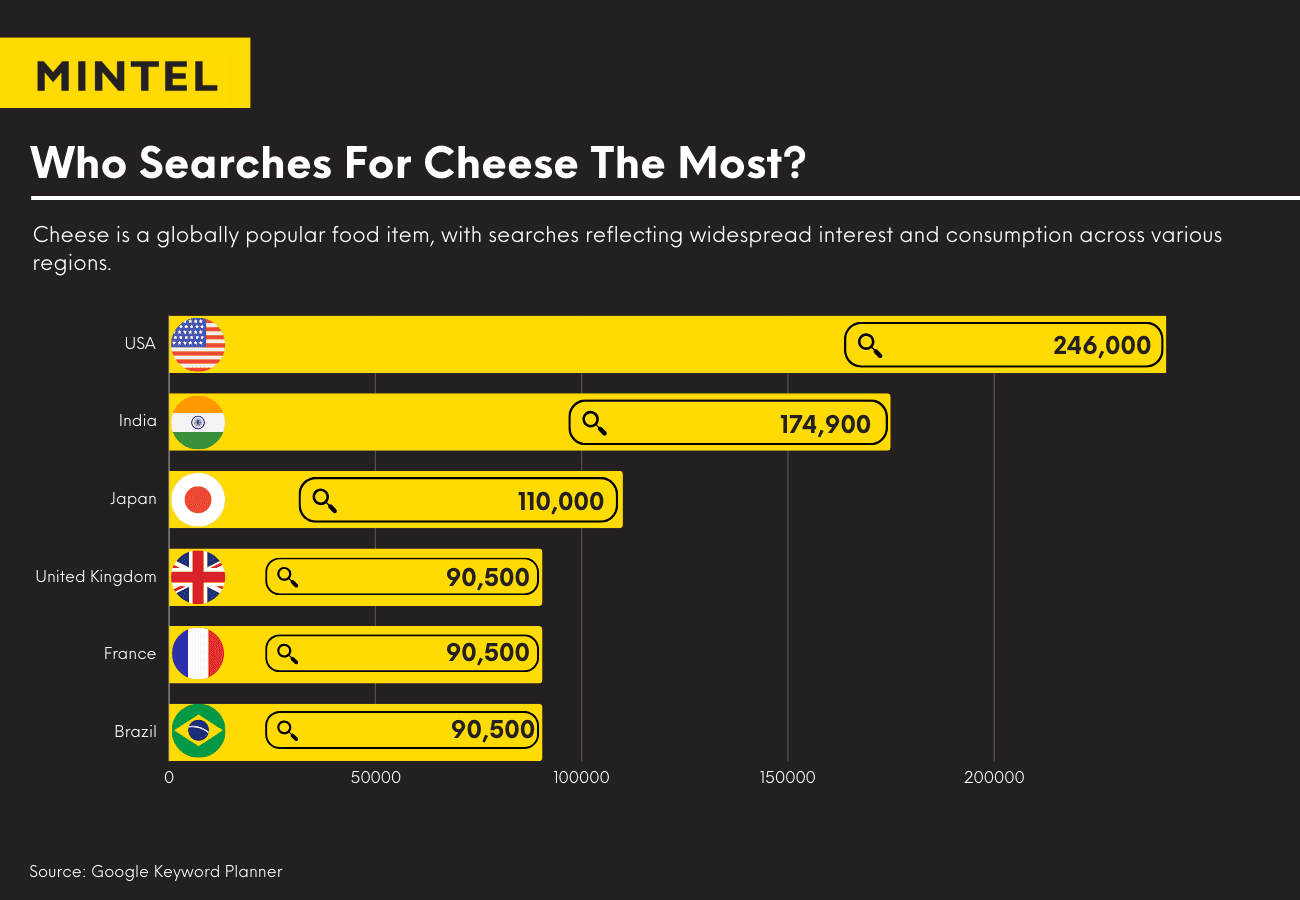With a global cheese market that is still growing, cheese has long been a dietary staple for communities around the world. Though its exact origins are unknown, cheese has a history dating back to around 8000 BCE. There are references to cheesemaking in ancient Greek mythology and in imagery in ancient Egyptian tomb murals, so we can say with confidence that people all over the world have been enjoying eating cheese for many hundreds of years.
To get an understanding of just how popular cheese is around the world in 2024, Mintel has collated data to explore and analyse which nations love cheese the most.
We’ve taken a look at the countries where cheeses originate, which import the most cheese, and which are the most interested in cheese. Using this data, we have scored each nation out of 100 based on their imports, original cheese production, and Google searches for ‘cheese’ in native languages, and ranked our very own top ten. Join Mintel as we reveal the world’s cheesiest nations.

Mintel’s Top 10 Cheesiest Nations
1. Netherlands
Score: 76.8/100
With 38 cheese varieties originating in the Netherlands, including global favourites like gouda and edam, it should come as no surprise that the Netherlands is the number one nation of cheese lovers in the world! However, with a relatively small population of 17 million, it is impressive that the Netherlands has beaten much bigger countries to the top spot. Their small population imports more than $14 worth of cheese per person each year, making them the biggest cheese buyers of any nation.
The Netherlands secured their reputation by having the most Google searches for ‘cheese’ in native languages per capita out of all the countries in the world. Not only are they searching for cheese, but they buy a lot of it too. In the Netherlands, an average of 3.1kg of cheese is imported per person each year, making them the cheesiest nation in the world.
2. France
Score: 39.3/100
With a staggering trade value of almost 375 million USD, France really puts its money where its mouth is when it comes to loving cheese. Plus, with 246 varieties of cheese hailing from France, including staples like brie, roquefort, and camembert, France is a major player in cheese production globally. To say that the French love cheese would be underselling it – with over 90,000 Google searches monthly for ‘fromage’, it is clear that France deserves its position as the second cheesiest nation. However, Mintel reported in 2024 that a quarter of French consumers said that they were eating less cheese as a result of environmental concerns, so perhaps we can expect to see France’s position adjust in this list in the near future.
3. Belgium
Score: 39.1/100
As a nation that isn’t famous for producing its own cheeses, unlike some other countries in this list, Belgium may be a surprise appearance. With only 13 cheeses hailing from Belgium, and a relatively low level of Google searches each month, Belgium could be mistaken for a relatively non-cheesy country.
However, with an average trade value per person of more than $11, they come in second to the Netherlands in terms of value per capita. To look at that another way, Belgians import more than 1.6kg of cheese per person each year – ranking second in the world. So, it may be a small nation, but it is a nation of cheese lovers!
4. USA
Score: 31.7/100
First and foremost, the USA is one of the cheesiest countries in the world simply because of how many cheeses they have on offer! There are 523 cheeses which originate in the USA, so that’s plenty of options for all palates.
The USA has the third-largest population (333 million people) of the countries we analysed, behind only India and China. So, given the extremely high population, it is surprising that the USA is not the world’s biggest importer of cheese. In fact, it falls behind 29 other countries whose trade value is greater than that of the USA, including much smaller nations like Austria, Lebanon, and Norway.
However, with the majority of Americans saying they have not heard of cheeses like paneer and halloumi, but 96% eating Cheddar, the relatively low trade value could speak to more local tastes. With more than five hundred American cheese varieties, it seems that Americans prefer to consume their own cheese rather than imported varieties.
5. Austria
Score: 30.7/100
Another European cheese-loving nation, Austria ranks fourth in the world for trade value per capita. Spending more than $64 million on importing cheeses per year, and with 41 Austrian cheese varieties to enjoy, including bergkäse and alpenkäse, it is clear that Austria is a nation eager to indulge in cheese, both in variety and abundance.
6. United Kingdom
Score: 30.3/100
Famous for cheese like Cheddar and Stilton, the United Kingdom has earned its spot on the list of the world’s cheesiest countries. Achieving the same number of Google Searches per year as France, but with a population of one million fewer people, the people of the UK show a clear love for cheese. This love is set to grow, having already grown by 44% in the last five years, as Mintel forecasts UK cheese sales to reach £4.5 billion by 2028.
But how does this love translate into financial value, beyond search interest? The UK has a trade value per capita of around $2.15 – a relatively low value for a nation with an evident interest in cheese. Similarly to the USA, the UK has a great many native cheeses – 261 in total. With 70% of British consumers purchasing cheddar, and a further 36% purchasing regional British cheeses, it seems that cheese lovers in the UK prefer to eat cheeses from the UK than to import.
7. Switzerland
Score: 29.1/100
With Switzerland ranking as the seventh cheesiest nation in the world, Europe is represented once more in its love of cheese!
Switzerland is especially prolific in importing cheese, ranking third highest in the world for trade value per capita; falling just behind the Netherlands and Belgium. This might be slightly surprising considering Swiss cheese is a globally well-known variety, but with 32 varieties of cheese coming from Switzerland, they are relatively low in terms of in-house production. Despite Swiss cheese being a beloved variety, it seems Swiss consumers prefer to import more exotic cheeses from other nations.
8-10. Scandinavia
Score: 27.9/100
With cheese consumption particularly consistent across Scandinavia, Sweden secures 8th position and is followed closely by Denmark and then Finland in the list of the world’s most cheese-loving nations. Despite coming in our final slot in our cheese-loving list, Finland spends the most on importing cheeses per capita, with Sweden and Denmark spending between $4-5 per person. Also, Finland spends $5.64 per person, which puts them ahead of Sweden and Denmark in terms of average spend.
However, Finland loses points in their online interest in cheese, as well as their own cheese production. Finland’s cheese-related Google Searches total around a third fewer than Denmark’s per month, with Denmark demonstrating the third-highest monthly search volume. This indicates to us that Finland displays the least online interest in cheese of the three nations.
Finally, Sweden takes the (cheese)cake with their own cheese production. There are 25 cheese varieties with origins in Sweden, compared to only 16 in Denmark and 6 in Finland.Explore our Cheese Research
Who Imports the Most Cheese?
So, we know which countries are the biggest cheese lovers overall – but which nations spend the most on importing their favourite dairy products? Let’s dive into the UN Comtrade data to analyse which countries are importing the most cheese.

In terms of trade value in USD:
1. France
France is the biggest importer of cheese in the world, spending a total of $374 million on cheese each year. With a small population and plenty of native cheeses, this is a staggering amount. This speaks to a growing trend in France of eating cheese as a cost-effective alternative to meat, with nearly half of French consumers doing so.
2. Germany
Not appearing in Mintel’s overall list of Top 10 Cheesiest Nations, Germany is in fact the second largest importer of cheeses in the world. Germany spends $294 million on cheese imports per year.
3. Mexico
With only 11 varieties of cheese originating in Mexico, there is a love of cheese that must be imported. This is why Mexico is spending $276 million on cheese imports per year.
4. Netherlands
The cheesiest country in the world, the Netherlands imports a whole lot of cheese – totalling a spend of $259 million per year.
5. China
Despite not featuring in Mintel’s Top 10 Cheesiest Nations, China imports a whopping $186 million worth of cheese each year to accommodate their vast population.

In terms of net weight in kilograms:
1. Mexico
In the top spot for cheese imports by weight, Mexico brings in 56 million kilograms of cheese each year.
2. Netherlands
Our cheesiest nation imports almost as much as Mexico, which has seven times the population. The Netherlands imports 55 million kilograms of cheese per year.
3. France
The second cheesiest nation in the world is third in terms of imports by weight, bringing in 52 million kilograms of cheese per year.
4. Germany
Germany secures its spot as a huge importer of cheese, in weight as well as trade value, importing 45 million kilograms of cheese per year.
5. China
With such a large population, it is no surprise that even as a relatively non-cheesy nation, China still imports 33 million kilograms of cheese per year.
Who searches for cheese the most?
Being a nation of cheese lovers isn’t just about how much you buy – it’s also about how interested you are in cheese. Let’s have a look at which countries search cheese-related queries the most, using Google Ads Search data.

1. USA
With a large population of cheese lovers, and ranking fourth on our Top Ten list of cheese-loving nations, the people of the USA use Google to search for cheese more than 246,000 times each month. That’s equivalent to 6.6 times per person.
2. India
Although India is not one of the world’s cheesiest nations, paneer cheese is a staple of many Indian diets as a source of protein and an alternative to meat in meals. This could be why Indians search cheese-related queries 175,000 times per month.
3. Japan
Although Japan ranks low on the list of cheesiest countries in the world, at 29th, they search for cheese 110,000 times per month, placing them above the UK in cheese-related search queries.
4. United Kingdom
One of the biggest consumers and producers of cheese in the world, the people of the UK are also interested in searching online for cheese! 90,500 times per month, to be exact.
5. France
With the same monthly search volume as the UK, but a larger population, France comes in at fifth, in terms of the countries most commonly searching for cheese online.
6. Brazil
Again searching for cheese-related queries 90,500 times per month, but with a much larger population, Brazil ranks just behind the UK and France in search total.
| Country | Trade Value(USD) | Net Weight(kg) | Number of Cheese | Search Volume | Score out of 100 |
|---|---|---|---|---|---|
| Andorra | 401,589.00 | 63,408.00 | 1.00 | 30.00 | 18.40 |
| Argentina | 1,374,135.00 | 141,425.00 | 3.00 | 33,100.00 | 6.60 |
| Armenia | 23,954.00 | 2,027.00 | 1.00 | 390.00 | 1.30 |
| Australia | 57,844,063.00 | 14,227,748.00 | 99.00 | 40,500.00 | 26.90 |
| Austria | 64,771,023.00 | 11,248,356.00 | 41.00 | 6,600.00 | 30.70 |
| Azerbaijan | 656,068.00 | 141,084.00 | 1.00 | 590.00 | 0.80 |
| Belgium | 130,532,359.00 | 19,155,018.00 | 13.00 | 8,100.00 | 39.10 |
Methodology & Sources
In order to determine the world’s biggest cheese lovers we created a seedlist of cheese-producing nations from cheese.com. We scraped cheese.com to get a list of how many cheeses are produced by each nation on their list.
We used the latest UN Comtrade data on imports of Cheese and Curd for each of these countries. We took data on Trade Value and Net Imports (kg).
We then wanted to find out which nation searches for ‘cheese’ the most. We then took a list of the official languages of each of these countries and translated the word for ‘cheese’. We then used these translations to find out how many times, on average, each nation searched for cheese each month between Jan 2023 – Dec 2023.




















